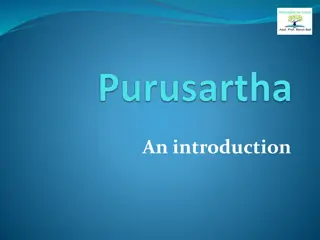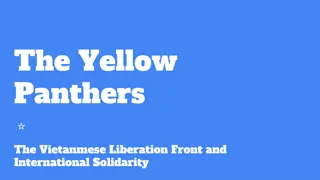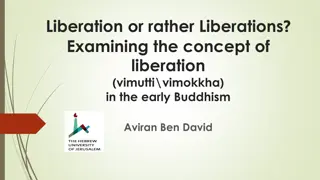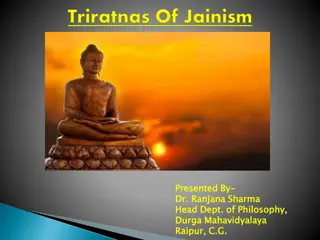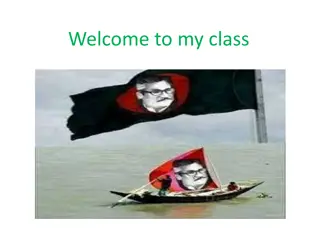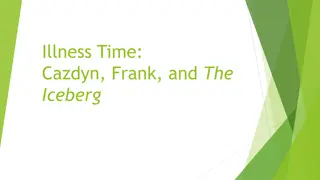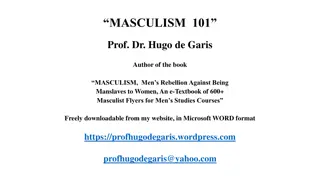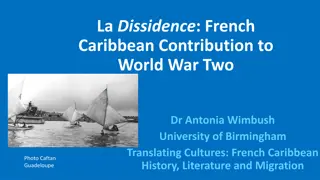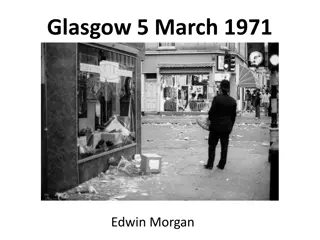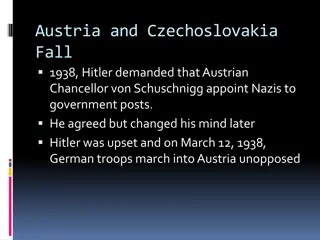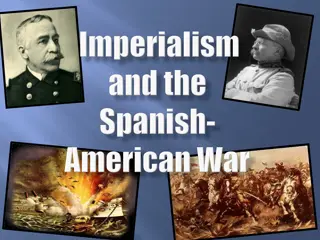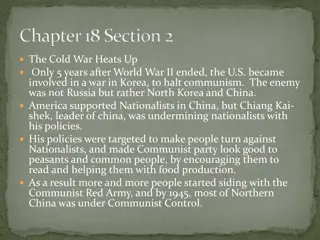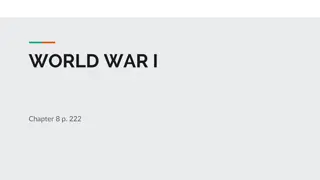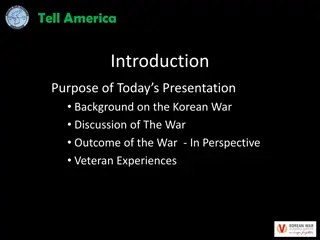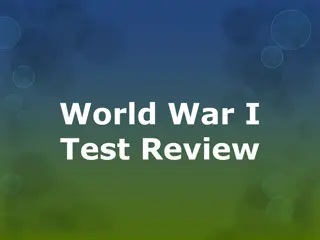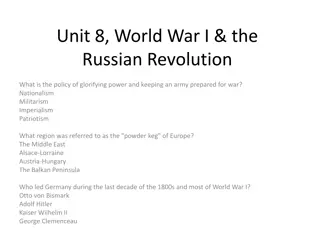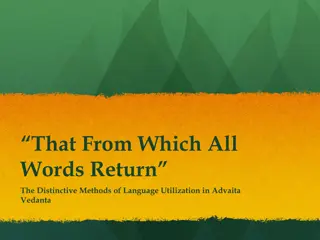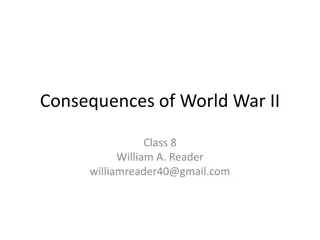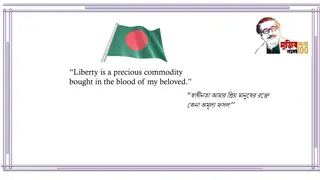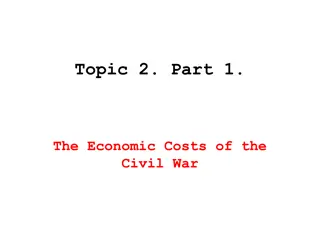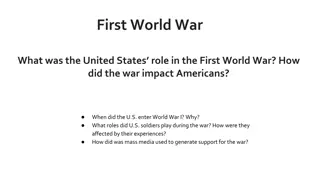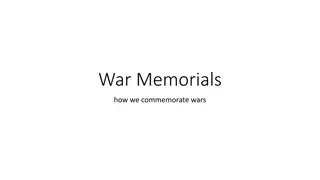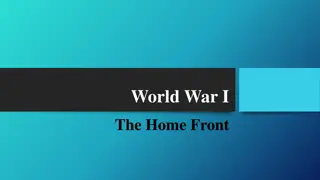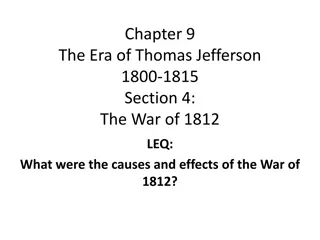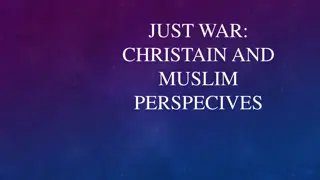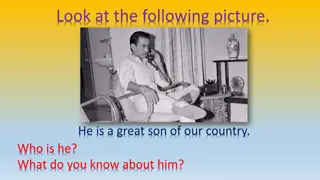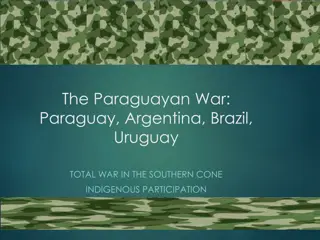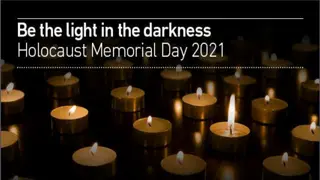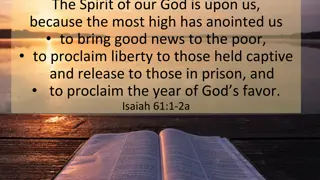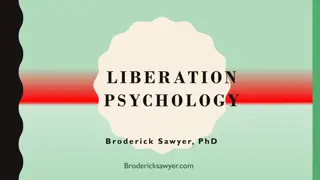❤[PDF]⚡ Civil War Talks: Further Reminiscences of George S. Bernard and His Fel
\"COPY LINK HERE ; https:\/\/getpdf.readbooks.link\/0813931754\n\nRead ebook [PDF] Civil War Talks: Further Reminiscences of George S. Bernard and His Fellow Veterans (A Nation Divided: Studies in the Civil War Era) | Civil War Talks: Further Reminiscences of George S. Bernard and His Fellow Vetera
1 views • 6 slides
Understanding Purusharthas: The Four Goals of Human Life
Purushartha, derived from Sanskrit, encompasses the four life goals of dharma (duty), artha (prosperity), kama (pleasure), and moksha (liberation). Dharma, the foundation, guides the pursuit of the other goals leading to spiritual fulfillment. While dharma is considered paramount, moksha is ideal, e
6 views • 17 slides
World War 2 Key Events and Operations
World War 2, spanning from 1939 to 1945, saw significant events like the invasion of Poland, Operation Barbarossa, D-Day landings, and the conclusion with V-E and V-J Days. Operations such as Dieppe (Operation Jubilee) in 1942 taught crucial lessons in military strategy and coordination. The Atlanti
2 views • 38 slides
International Solidarity Movements of the Black Panther Party and Vietnamese Liberation Front
Explore the historical connections and international alliances between the Black Panther Party and the Vietnamese Liberation Front, highlighting key events and figures such as Bobby Seale, Eldridge Cleaver, Huey P. Newton, and Nguyen Thi Dinh. Discover the shared activism, cultural exchanges, and ef
0 views • 8 slides
The Homefront: U.S. War Production Efforts During World War II
During World War II, the United States mobilized its industries for total war production, converting peacetime factories into facilities for producing planes, tanks, rifles, and more. The U.S. became the Allies' biggest armaments supplier, producing millions of war supplies and significantly boostin
2 views • 25 slides
Origins of the Cold War: Yalta and Potsdam Conferences 1945
The Cold War's origins stem from the tensions and suspicions between the USSR and the West post-World War II, highlighted through conferences like Yalta and Potsdam. At the Yalta Conference, held in February 1945, crucial decisions were made regarding Germany, Poland, and the UN. The Potsdam Confere
0 views • 10 slides
Exploring Liberation in Early Buddhism: Vimutti and Vimokkha Concepts
This research delves into the concept of liberation (vimutti\vimokkha) in early Buddhism through examining key sources such as Nikayas and descriptions of arahants. It discusses the significance of liberation as a final goal, different stages of liberation, defilements, noble fruits, and the various
0 views • 16 slides
Insights into World War Two and Adolf Hitler's Role
World War Two started on September 3, 1939, with Britain and France declaring war on Germany. Adolf Hitler's rise to power, initiation of the war, and involvement in the Holocaust are highlighted. The Star of David symbolized Jewish identity under Hitler's rule, and the Holocaust saw six million Eur
0 views • 6 slides
Analysis of Jackie Kay's Poems on Fear, Liberation, and Everyday Situations
In this analysis, we delve into Jackie Kay's poems "Lucozade" and "Lucozade 1" to explore themes of fear, liberation, and transforming ordinary events into thought-provoking moments. Kay's evocative language captures the speaker's anxiety about losing their mother, the mother's disdain for hospital
0 views • 81 slides
Understanding Jainism: Path to Liberation and Right Conducts
Jainism, an ancient religion, emphasizes the path to liberation through Triratna - right faith, knowledge, and conduct. The teachings of Tirthankars guide followers towards dissociation of the soul from matter and practicing virtues like forgiveness, truthfulness, and celibacy to eliminate karmas. B
0 views • 15 slides
English Class: Bangabandhu's Family in 1971 Liberation War
Welcome to Md. Shahneoaz's English class at Jalalabad B/L High School. Explore the topic of Bangabandhu's family during the 1971 liberation war. Learn new words related to peace, understanding, and overcoming obstacles. Engage in silent reading activities and pair work to deepen your knowledge.
0 views • 16 slides
Reflections on Illness and Time: Crisis, Transformation, and Liberation
Reflections on the complexities of time in the context of illness and crisis are brought forth in the readings of Cazdyn, Frank, and The Iceberg. The narratives delve into the stretching of time during crises, the interplay between chronic time and the threat of relapse, and the ever-present nature
0 views • 14 slides
Masculism 101: A Men's Movement for Liberation in the 2020s
Masculism, spearheaded by Prof. Dr. Hugo de Garis, advocates for men's liberation from being manslaves to women. It highlights the shift in gender dynamics, emphasizing women's freedom brought about by advancements like the contraceptive Pill and the need for women to work in the modern era. The mov
0 views • 46 slides
Analysis of W.B. Yeats' Poetry During World War I
W.B. Yeats' poetry during World War I reflects a unique perspective on the conflict, as seen in works like "An Irish Airman Foresees His Death" and "On Being Asked for a War Poem." Delving into themes of sacrifice, duty, and the futility of war, Yeats offers a contrasting view to the graphic realism
0 views • 7 slides
French Caribbean Contribution to World War Two
During World War Two, 4000-5000 men and women from the French Caribbean islands played a significant role in the liberation of Occupied France, a contribution often overlooked in official narratives. This historical context sheds light on the struggles and resilience of the dissidents who escaped to
0 views • 16 slides
Analysis of "Glasgow 5 March 1971" by Edwin Morgan
Edwin Morgan's "Glasgow 5 March 1971" is part of his collection "Instamatic Poems". It vividly describes a violent incident in Glasgow where a young couple is pushed into a shop window by two youths attempting robbery. The poem explores themes of violence and social responsibility in a free verse fo
0 views • 13 slides
Timeline of Key Events Leading to World War II
In the years leading up to World War II, a series of significant events unfolded in Europe. From Hitler's demands and annexations to the signing of pacts and the invasion of Poland, tensions escalated rapidly. The Munich Agreement, German offensive in Poland, declaration of war by France and Britain
0 views • 12 slides
The Impact of the Korean War on Global Relations
The Korean War, often dubbed the "Forgotten War," had significant implications on global politics and relationships. This conflict was characterized by a mix of conventional and guerilla warfare tactics. China's involvement in the war had a profound impact on its relations with the U.S. and the U.S.
0 views • 14 slides
The Spanish-American War: Origins and Impact
The Spanish-American War was fueled by a combination of factors including economic struggles, imperial ambitions, and sensationalist journalism. Theodore Roosevelt's stance on war, coupled with the desire for Cuba's independence from Spain, led to a call for war in the late 1890s. Yellow journalism
0 views • 18 slides
The Cold War Heats Up: Korea and China Conflict
The post-World War II era saw the U.S. engaging in the Korean War to combat communism, facing off against North Korea and China instead of Russia. Conflict in China between the Nationalists led by Chiang Kai-shek and the Communists under Mao Tse-tung intensified, with Chiang's authoritarian rule spa
0 views • 14 slides
Causes and Outbreak of World War I
Various factors such as nationalism, imperialism, militarism, and the assassination of Archduke Francis Ferdinand led to the outbreak of World War I. The tensions in Europe escalated as countries formed alliances and mobilized for war. The conflict resulted in early battles like the Battle of Marne
0 views • 23 slides
Overview of the Korean War: Background, Discussion, and Outcome
This presentation delves into the background of the Korean War, highlighting the historical context from the Korean Peninsula's division after World War II to the outbreak of the conflict in 1950. It discusses the involvement of North and South Korea, as well as key players like the United States, t
0 views • 15 slides
World War I Test Review and Historical Overview
Learn about the key terms and concepts related to World War I, including militarism, nationalism, neutrality, propaganda, espionage, and more. Explore the long-term causes of the war, the immediate trigger, the Central Powers and Allied Powers involved, as well as important events like the Zimmerman
0 views • 13 slides
World War I and the Treaty of Versailles: Key Events and Consequences
The policy of glorifying power and militarism, the tensions in the Balkan Peninsula, Germany's leadership, causes of the United States' entry into World War I, impact of unrestricted submarine warfare, transition to total war, the end of the war with an armistice, the Treaty of Versailles assigning
0 views • 10 slides
Insights into Advaita Vedanta and Hinduism: Tradition, Knowledge, and Liberation
Explore the profound concepts of Advaita Vedanta and the rich diversity of Hinduism. Dive into the distinctive methods of language utilization, the tradition's reliance on Vedas and Upanishads, the criteria for valid knowledge, the essence of Brahman as the ultimate reality, and the challenges in kn
0 views • 15 slides
The Impact of World War II on Japan and the Emergence of the Cold War
World War II had far-reaching consequences on Japan, leading to significant naval battles, intense fighting in Okinawa, and ultimately, the country's surrender following the atomic bombings of Hiroshima and Nagasaki. The post-war period saw the emergence of the Cold War as tensions rose between the
0 views • 63 slides
Bangabandhu Sheikh Mujibur Rahman's Family and the Declaration of Independence in 1971
The story revolves around events in 1971, focusing on the peaceful atmosphere at Bangabandhu Sheikh Mujibur Rahman's home, the formation of barricades against the Pakistani Army, and the sending of the Declaration of Independence. Learners will explore the importance of liberty through images and te
0 views • 20 slides
The Economic Costs of the Civil War and Its Impact on Growth
The Civil War led to significant economic costs for both the North and the South, including direct expenses such as government spending, destruction of physical and human capital, and indirect costs due to reduced consumption. The war resulted in massive casualties and had a profound impact on the e
0 views • 34 slides
The Night of 25th March 1971: Tragic Events Unfolded at Bangabandhu's House
The night of 25th March 1971 was filled with tragedy as Bangabandhu Sheikh Mujibur Rahman and his family faced imminent danger amidst the chaos and violence in Bangladesh. Gunshots echoed, leading to decisions of sending the family members to safety, culminating in the declaration of Independence, y
0 views • 12 slides
The United States in World War I: Impact, Soldiers' Experiences, and Media Support
The United States played a significant role in World War I, entering the war in 1917 and sending soldiers to fight in Europe. The war impacted Americans socially and economically. U.S. soldiers served in various roles and were affected by their experiences. Mass media was used to generate support fo
0 views • 15 slides
Honoring Sacrifice: War Memorials Across the Globe
Explore a visual journey through various war memorials such as the Boer War Memorial in Belfast, the Menin Gate in Ypres, the Cenotaph in London, the Tomb of the Unknown Warrior in Westminster Abbey, the Korean War Veterans Memorial in Washington DC, the Vietnam Veterans Memorial Wall in Washington
0 views • 9 slides
America's Role on the Home Front during World War I
During World War I, America witnessed significant changes on the home front as the government took on new powers to regulate industry, agriculture, and public opinion. Women and minorities played crucial roles, voluntary rationing was embraced, and opposition by conscientious objectors was met with
0 views • 24 slides
The War of 1812: Causes, Events, and Effects
The War of 1812 was influenced by issues such as British impressment of American sailors, arming Native Americans, and trade restrictions. Despite opposition, President James Madison declared war in 1812. The conflict marked a period of American nationalism, with War Hawks pushing for war and Doves
0 views • 16 slides
Perspectives on Just War Theory from Christian and Muslim Standpoints
Just War Theory, rooted in Christian philosophy, aims to justify the use of force in specific circumstances to defend justice and protect human life. While pacifists reject all forms of war, adherents of the theory believe in certain criteria that must be met for a war to be considered just, such as
0 views • 16 slides
Remembering Zahir Raihan: A Patriot and Filmmaker of Bangladesh
Zahir Raihan, a prominent figure in Bangladeshi cinema and history, was born on August 19, 1935, in the village of Majupur. He played an active role in the Language Movement and participated in key events such as the procession on February 21, 1952, despite bans. Raihan's legacy extends to his invol
0 views • 21 slides
The Paraguayan War: Total Conflict in the Southern Cone
The Paraguayan War, also known as the War of the Triple Alliance, involved Paraguay, Argentina, Brazil, and Uruguay in a brutal conflict from 1864 to 1870. President Carlos Antonio López's policies and the ambitions of Francisco Solano López led to Paraguay's defiance of its neighbors, resulting i
0 views • 10 slides
Remembering the Holocaust: Auschwitz Liberation and Holocaust Memorial Day
The 27th of January marks Holocaust Memorial Day, commemorating the liberation of Auschwitz by Russian soldiers. This day serves as a reminder of the atrocities of the Holocaust, where six million Jews were murdered by Hitler and the Nazis during World War II. The Holocaust Memorial Trust emphasizes
0 views • 11 slides
United Methodist Church: A Call for Liberation and Justice
The United Methodist Church is called to bring good news to the marginalized, proclaim liberty, and work for justice. Embracing liberation by resisting evil and oppression, the church aims to form a community where all are valued, power is shared equitably, and solidarity with justice movements is u
0 views • 16 slides
Learning about Bangabandhu's Family in 1971 - Educational Unit
Explore the historical account of Bangabandhu's family during the Liberation War of 1971. Uncover the sufferings, tortures, and brave actions of the family members amidst the tumultuous period. Dive into the learning outcomes and engage with word meanings to deepen understanding. Discover the resili
0 views • 19 slides
Liberation Psychology: Uncovering Historical Traumas and Injustices
Explore the profound impact of historical traumas and injustices on psychological well-being, as discussed by Dr. Broderick Sawyer. Delve into narratives of liberation, accountability, and the enduring effects of societal conditioning on marginalized communities. Reflect on the complexities of integ
0 views • 22 slides
![❤[PDF]⚡ Civil War Talks: Further Reminiscences of George S. Bernard and His Fel](/thumb/20551/pdf-civil-war-talks-further-reminiscences-of-george-s-bernard-and-his-fel.jpg)
